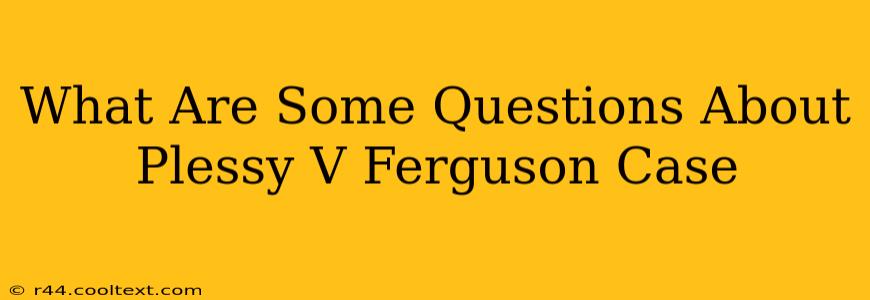The 1896 Supreme Court case Plessy v. Ferguson remains a landmark decision, though one widely criticized for its upholding of racial segregation. Understanding its complexities requires exploring several key questions. This post delves into some of the most important ones, examining the case's lasting impact and its continuing relevance in modern discussions about racial equality.
What was the central issue in Plessy v. Ferguson?
The core issue in Plessy v. Ferguson was the constitutionality of racial segregation under the "separate but equal" doctrine. Homer Plessy, a mixed-race man, challenged a Louisiana law requiring separate railway cars for Black and white passengers. The case questioned whether this segregation violated the Thirteenth and Fourteenth Amendments to the U.S. Constitution, which respectively abolished slavery and guaranteed equal protection under the law.
What was the Supreme Court's ruling in Plessy v. Ferguson?
The Supreme Court ruled 7-1 in favor of Ferguson, upholding the Louisiana law. The majority opinion argued that separate facilities for Black and white people did not inherently violate the Fourteenth Amendment as long as the facilities were "separate but equal." This legal doctrine provided a framework for the establishment of Jim Crow laws across the Southern United States, leading to widespread segregation in various aspects of life, including education, transportation, and public accommodations.
What were the dissenting opinions in Plessy v. Ferguson?
Justice John Marshall Harlan's powerful dissenting opinion stands in stark contrast to the majority. He argued that the Constitution is "color-blind," and that the separation of races based on skin color is inherently unequal and a violation of the principle of equality. His dissent foreshadowed the later overturning of Plessy v. Ferguson and became a cornerstone of the Civil Rights Movement. Understanding the dissent is crucial to grasping the moral and legal flaws in the majority opinion.
How did Plessy v. Ferguson impact American society?
The Plessy v. Ferguson decision had a profoundly negative impact on American society. It legitimized racial segregation for nearly six decades, resulting in systemic inequality and discrimination against African Americans. This case fostered a climate of racial injustice that impacted education, healthcare, employment, and housing, perpetuating a cycle of poverty and disadvantage that continues to resonate today. The legacy of this decision is a significant factor in understanding modern racial disparities.
How was Plessy v. Ferguson eventually overturned?
The "separate but equal" doctrine established in Plessy v. Ferguson was ultimately overturned by the Supreme Court in Brown v. Board of Education (1954). This landmark case declared state laws establishing separate public schools for Black and white students to be unconstitutional. Brown v. Board directly challenged and rejected the central tenet of Plessy v. Ferguson, marking a turning point in the Civil Rights Movement and a crucial step towards dismantling racial segregation in the United States.
Why is Plessy v. Ferguson still relevant today?
Understanding Plessy v. Ferguson remains crucial today because its legacy continues to influence contemporary discussions about racial justice and equality. The case serves as a stark reminder of the dangers of legalizing discrimination and the long-lasting effects of systemic racism. Studying this case helps us understand the ongoing struggle for racial equality and the importance of fighting against all forms of discrimination. The case’s impact on modern issues such as disparities in education, housing, and criminal justice cannot be ignored. Its historical significance continues to shape debates surrounding affirmative action, reparations, and other crucial aspects of racial justice.
By exploring these key questions surrounding Plessy v. Ferguson, we can gain a deeper understanding of this pivotal case, its lasting consequences, and its enduring relevance in the ongoing pursuit of racial equality in the United States.

